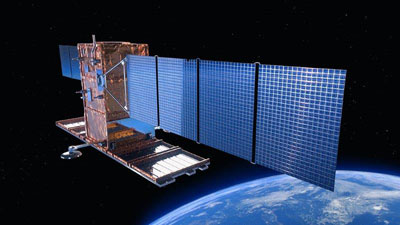Featured
About COSMO-SkyMed Second Generation

COSMO-SkyMed Second Generation (CSG) is at the forefront of radar technology, and will ensure improvements and guarantee continuity with the First Generation COSMO-SkyMed (CSK) satellites, preserving the high quality and the highest precision features, both required for the interferometric activities.
The programme is funded by Agenzia Spaziale Italiana (ASI), the Italian Ministry of Defence and the Italian Ministry of Education, Universities and Scientific Research.
As with the four first-generation satellites, the second-generation satellites are defined as a dual system (civil and military).
COSMO-SkyMed Second Generation consists of two enhanced SAR satellites:
- CSG-1, the first satellite of the COSMO-SkyMed Second Generation, successfully launched on 18 December 2019 from Kourou Space Center (French Guiana) using a Soyuz launcher
- CSG-2, the second satellite, successfully launched on 31 January 2022 from Cape Canaveral (USA) on Falcon 9.
| Launch Dates | CSG-1: 18 December 2019 CSG-2: 31 January 2022 |
| Orbit Height | 619.6 km |
| Orbit Type | Sun-synchronous polar orbit |
| Nominal Local Time at Ascending Node | 06:00 AM |
| Orbit Inclination | 97.87° |
| Orbit Period | 97.2 minutes |
| Repeat Cycle | 16 days |
COSMO-SkyMed Second Generation is part of ESA's Third Party Missions Programme, in which ESA has an agreement with ASI to distribute data products from the mission.
Objectives
COSMO-SkyMed Second Generation (CSG) is the follow-on mission to COSMO-SkyMed (CSK) assuring continuity and improvement of the supply of SAR services through data and products, to preserve and enhance the ability of customers and operational users to fulfil their mandates.
CSG represents a step ahead to bring the best advantages of the space observation to the largest number of people, to improve the integrity of the environment, quality of life, safety and security.
COSMO-SkyMed Second Generation's purpose is to monitor the Earth for the sake of emergency prevention, strategy, scientific and commercial purposes, providing data on a global scale to support a variety of applications among which risk management, cartography, forest & environment protection, natural resources exploration, land management, defense and security, maritime surveillance, food & agriculture management.
Instruments
The COSMO-SkyMed Second Generation satellites carry a SAR instrument operating in the X-band. The instrument operates in different imaging modes with Single or Dual polarisation satisfying different needs.
| Type | Synthetic Aperture Radar (SAR) |
| Sensor Modes | Spotlight Stripmap Pingpong Quad Pol ScanSAR |
| Resolution (Az. x Ra.) | Spotlight-2A: 0.3 x 0.5 m Spotlight-2B: 0.6 x 0.6 m Spotlight-2C: 0.8 x 0.8 m StripMap: 3 x 3 m Pingpong: 12 x 5 m Quad Pol: 3 x 3 m ScanSAR-1: 20 x 4 m ScanSAR-2: 40 x 6 m |
| Scene size (Az. x Ra.) | Spotlight-2A: 3.5 x 7 km · Spotlight-2B: 10 x 10 km Spotlight-2C: 5 x 10 km Stripmap: 40 x 40 km Pingpong: 40 x 40 km Quad Pol: 40 x 15 km ScanSAR-1: 100 x 100 km ScanSAR-2: 200 x 200 km |
| Polarisation | Spotlight: HH or VV or HH+HV or VV+VH Stripmap: HH or VV or HH+HV or VV+VH Pingpong: HH+VV or HH/VH+HV/VV Quad Pol: HH + VH + HV + VV ScanSAR-1: HH or VV or HH+HV or VV+VH ScanSAR-2: HH or VV or HH+HV or VV+VH |
Data
DATA COLLECTIONS
For scientific research and application development (both archived and new acquisitions), COSMO-SkyMed Second Generation data collections are available for free following the approval of a project proposal. ESA will support as many high-quality and innovative projects as possible within the quota limit available, therefore only a limited amount of products can be made available to each project.
DATA TOOLS
A number of tools are available for visualising, processing and analysing COSMO-SkyMed SG data.
PolSARpro
PolSARpro (Polarimetric SAR data Processing and Education) supports the scientific exploitation of polarimetric SAR data and is a tool for high-level education in radar polarimetry.

